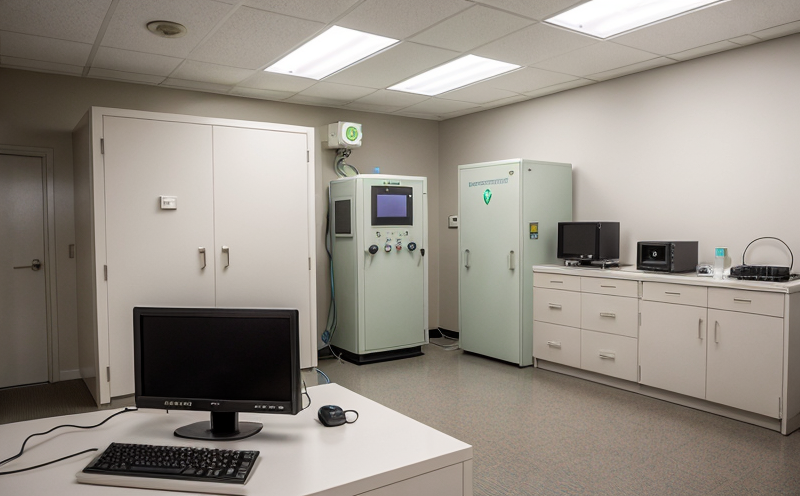ISO 21909-2 Neutron Personal Dosimeter Performance Testing
The ISO 21909-2 standard specifies the performance testing of neutron personal dosimeters (NPDs). These devices are essential for monitoring occupational exposure to ionizing radiation, particularly in industries such as nuclear power, medical facilities, and research laboratories. The testing ensures that NPDs meet stringent accuracy requirements, thereby protecting workers from excessive radiation doses.
The test procedure involves simulating real-world conditions under which the dosimeter will be used. This includes various neutron fluence rates, energy spectra, and ambient temperature conditions to evaluate how well the device can measure accurately. The testing process is critical for compliance with international safety standards and regulations.
During testing, the dosimeter is exposed to a known radiation source according to predefined criteria in ISO 21909-2. The response of the dosimeter is then compared against reference data derived from independent measurements or certified standards. If discrepancies are found, adjustments can be made to improve performance.
The standard covers a wide range of testing scenarios, including high and low fluence rates, different neutron energy spectra, and various ambient temperature conditions. This comprehensive approach ensures that the dosimeter performs reliably across diverse operational environments. The test results provide assurance that the device meets the specified accuracy requirements as outlined in ISO 21909-2.
Testing NPDs under these conditions is essential for verifying their performance in real-world scenarios, which can vary significantly from laboratory settings. This testing helps to identify potential issues early on and ensures that any necessary calibration or adjustments are made before the dosimeter is deployed in operational environments.
The accuracy of neutron personal dosimeters directly impacts worker safety and compliance with regulatory requirements. Therefore, regular performance testing according to ISO 21909-2 is crucial for maintaining reliability and ensuring that occupational exposure limits are not exceeded.
In summary, the ISO 21909-2 test ensures that neutron personal dosimeters meet stringent accuracy standards, thereby protecting workers from excessive radiation. The comprehensive nature of this testing guarantees reliable performance across diverse operational conditions, making it an indispensable part of any radiation safety program.
Industry Applications
- Nuclear power plants
- Mining and mineral processing facilities
- Research laboratories
- Hospitals and medical institutions
- Aerospace industry for space radiation studies
- Defense and security sectors
- Environmental monitoring agencies
- Academic institutions conducting radiation research
The use of neutron personal dosimeters is widespread across various industries where occupational exposure to ionizing radiation is a concern. These devices are particularly crucial in environments with high levels of neutron radiation, such as nuclear power plants and mining operations.
In the aerospace industry, neutron dosimeters are used for space radiation studies to protect astronauts from harmful cosmic rays. In medical institutions, they ensure that healthcare workers comply with radiation safety regulations during diagnostic imaging procedures and other treatments involving ionizing radiation.
Research laboratories rely on these devices to monitor exposure levels in experiments involving nuclear materials or accelerators. Environmental monitoring agencies use neutron dosimeters to assess the impact of radiation on ecosystems near radioactive waste sites.
Why Choose This Test
Selecting ISO 21909-2 performance testing for neutron personal dosimeters offers several advantages, making it an essential part of any comprehensive occupational radiation safety program. Firstly, the test ensures that the dosimeter performs accurately under real-world conditions, which is critical for protecting workers from overexposure to ionizing radiation.
Secondly, compliance with international standards such as ISO 21909-2 demonstrates a commitment to worker safety and regulatory requirements. This can enhance an organization's reputation and credibility in the industry.
The test also helps identify potential issues early on, allowing for timely calibration or adjustments before deployment. This proactive approach minimizes risks associated with inaccurate dosimetry readings, which could lead to non-compliance or safety hazards.
Furthermore, regular testing ensures consistent performance over time, maintaining the reliability of the neutron personal dosimeter throughout its operational life cycle. This consistency is vital for accurate dose assessment and compliance monitoring.
Finally, choosing this test provides peace of mind by knowing that occupational exposure limits are consistently met, thereby protecting workers' health and safety. It also helps avoid costly penalties associated with non-compliance or accidents caused by inaccurate dosimetry readings.
Quality and Reliability Assurance
The ISO 21909-2 performance testing for neutron personal dosimeters is designed to ensure high-quality and reliable measurements of occupational radiation exposure. The standard specifies detailed procedures for simulating real-world conditions, including various neutron fluence rates, energy spectra, and ambient temperature variations.
During the test, the dosimeter is exposed to a known radiation source under controlled conditions that closely mimic actual operational scenarios. This approach ensures that any discrepancies between the dosimeter's readings and reference data are identified early on. Adjustments can then be made to improve performance, ensuring consistent accuracy over time.
The testing process involves comparing the dosimeter's response against reference data derived from independent measurements or certified standards. If significant deviations are detected, corrective actions are taken to address any issues. This rigorous quality assurance process helps maintain the reliability and accuracy of neutron personal dosimeters throughout their operational life cycle.
Regular performance testing according to ISO 21909-2 is essential for ensuring compliance with international safety standards and regulations. It guarantees that occupational exposure limits are consistently met, thereby protecting workers' health and safety. Additionally, this testing helps identify potential issues early on, minimizing the risks associated with inaccurate dosimetry readings.
By choosing ISO 21909-2 performance testing, organizations demonstrate a commitment to worker safety and regulatory compliance. This proactive approach not only enhances an organization's reputation but also contributes to a safer working environment for all personnel involved in radiation-sensitive activities.





